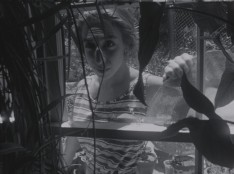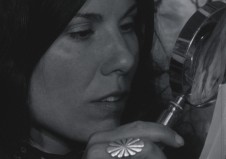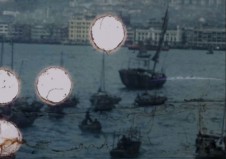Filmforum 50, program 2: The Women’s Gaze: Chick Strand’s Soft Fiction and Courtney Stephens’s Terra Femme

Amy Halpern in Soft Fiction, by Chick Strand
Los Angeles Filmforum presents
Filmforum 50, program 2: The Women’s Gaze: Chick Strand’s Soft Fiction and Courtney Stephens’s Terra Femme
Sunday December 7, 2025, 7:30 pm
At 2220 Arts + Archives, 2220 Beverly Blvd., Los Angeles CA 90057
In person: Courtney Stephens
Tickets: $15 general, $10 students/seniors, free for Filmforum members
https://link.dice.fm/S464c7fa1855
This program features a pair of films from two eras (or three, really) of Los Angeles filmmaking. Chick Strand (1931-2009) was one of the founders of Canyon Cinema, who relocated to Los Angeles in the late 1960s and became one of the critical filmmakers and teachers of film in the region from then until her death. Opinionated, unruly, insightful, visionary, Soft Fiction is one of her masterworks, an extended semi-personal documentary incorporating several stories by women of sensual experiences they had had.
Comprised of rare amateur travelogues shot by women between the 1920s-50s, Terra Femme is a live documentary by Courtney Stephens that weaves together questions of female authorship, cinematic excavation, and the Western gaze, complicating the freedoms these women experienced while traveling through foreign landscapes.
Both films pursue an alternative notion of what has been called ethnographic film, rooted in the experiences of women, released from standard expectations of behavior, removing false notions of objectivity in their personal expressions of worldly experience. The films speak to one another across eras: women traveling the world in the first half of the twentieth century, through a feminist documentary lens of the late 1970s, to the insightful reflections of today. Please join us for this special evening, with Soft Fiction on 16mm and the now-uncommon live performance version of Stephens’s Terra Femme.
Chick Strand's (1931-2009) accomplishments as an artist spanned more than three decades. In the early 1960s, with a new anthropology degree in hand, she turned her attention to ethnographic filmmaking. Her early work focused on Meso-American cultures explored through the language of the experimental documentary. In 1961, she founded Canyon Cinema with Bruce Baillie, an organization that, in 1965, spawned the San Francisco Cinematheque. They organized screenings of experimental, documentary and narrative films in East Bay backyards and community centers. Acting in response to a lack of public venues for independent movies, they were part of a wider explosion in American avant-garde film. The era was one of social idealism and communal energy, and the films they showcased boldly embraced purely cinematic visual expression and cultural critique.
Strand left Northern California in the late 1960s to pursue studies in ethnographic film at UCLA. She then joined the faculty of Occidental College, where she served as the director of the film as art program for a quarter of a century. In the 1970s she continued to define her visual technique, and her subjects more frequently became women. She soon evolved a distinctive film style: backlit subjects photographed in close up and in motion, with a handheld telephoto lens. The technique produced sensual, lyrical images that became Strand's signature. Her entire filmography numbers nearly a score of works, and along the way, she also become an accomplished photographer and painter.
Courtney Stephens is the director of four feature films. The American Sector (with Pacho Velez) follows slabs of the Berlin Wall installed around the US, and was named one of the best films of 2021 in The New Yorker. Terra Femme, composed of amateur travel footage shot by women in the early 20th century, was a New York Times critic’s pick and has toured widely as a live performance. John Lilly and the Earth Coincidence Control Office (with Michael Almereyda) explores the life of neuroscientist and psychedelics pioneer John C. Lilly, and Invention is a hybrid fiction film about an esoteric healing device that premiered at Locarno. Her films have been exhibited at MoMA, The National Gallery of Art, The Barbican, Fondazione Prada, Jeu de Paume, ICA London, and film festivals including the Berlinale, Rotterdam, Viennale, New Directors/New Films, IDFA, Visions Du Réel, Morelia, and the New York Film Festival. Her work has been released theatrically in the US, UK, and France, and she is the recipient of a Guggenheim Fellowship, a Fulbright Scholarship, and grants from the Sloan Foundation and the Foundation for Contemporary Art.
She has co-curated the miniature cinema Veggie Cloud since 2014, and organized film programs for The Getty, Museum of the Moving Image, Flaherty NYC, and Human Resources. Her writing has appeared in Film Comment, BOMB, Filmmaker, The New Inquiry, and Cabinet.

Soft Fiction
Soft Fiction
By Chick Strand
1979, 16mm, b&w, sound, 54 minutes
Soft Fiction (1979) by Chick Strand was restored in 2015 by the Academy Film Archive. Restoration funding provided by the Los Angeles County Museum of Art (LACMA) and The Film Foundation.
"Chick Strand's SOFT FICTION is a personal documentary that brilliantly portrays the survival power of female sensuality. It combines the documentary approach with a sensuous lyrical expressionism. Strand focuses her camera on people talking about their own experience, capturing subtle nuances in facial expressions and gestures that are rarely seen in cinema. The title SOFT FICTION works on several levels. It evokes the soft line between truth and fiction that characterizes Strand's own approach to documentary, and suggests the idea of softcore fiction, which is appropriate to the film's erotic content and style. It's rare to find an erotic film with a female perspective dominating both the narrative discourse and the visual and audio rhythms with which the film is structured. Strand continues to celebrate in her brilliant, innovative personal documentaries her theme, the reaffirmation of the tough resilience of the human spirit." - Marsha Kinder, Film Quarterly

Terra Femme
Terra Femme
By Courtney Stephens
Live performance version
2017-2021, digital, color, sound, 1 hour
Terra Femme is an essay film comprised of amateur travelogues filmed by women in the 1920s-1950s. With a score by Sarah Davachi, the film moves between geographical essay, personal inquiry, and historical speculation, examining these films as both private documents and accidental ethnographies. The films present a new type of traveler: no longer a male seeker of conquests, she might be a divorcee on a tour of biblical gardens, or a widow on a cruise to the North Pole. Representing the world through women’s eyes, the films raise questions about female representation in the archive and the role of amateur movie-making plays in understanding the participation of women in early non-fiction filmmaking.
"One thing these films encode is a profound absence: the general absence of women in the film archive and the larger absence of female figures in the historical record. They also explore the attempt to concretize ones own experience through the act of making cinema, while also acknowledging the other forms of power that gave these women access to film cameras in the first place. At once a film about longing for past worlds through cinematic excavation, this force flows in both directions: as women from the past convey themselves into the present through the power of their gaze.
“Whether live or recorded, the performance is surprisingly honest and human, powerfully effective without unnecessary affectation. The images and narration combine — at once both thoughtful and deeply-personal — as Stephens explores the intersections of gender, individuality, history, race, colonialism, the relationship between humans and nature, and the various meanings we discover and create as we move through, view, shape, and document different places and cultures.” – Ezra Haber Glenn, The Arts Fuse, https://artsfuse.org/240131/film-review-only-connect-terra-femme/
